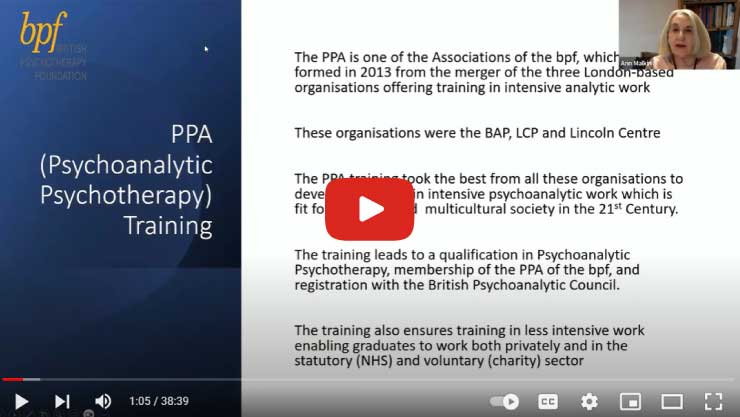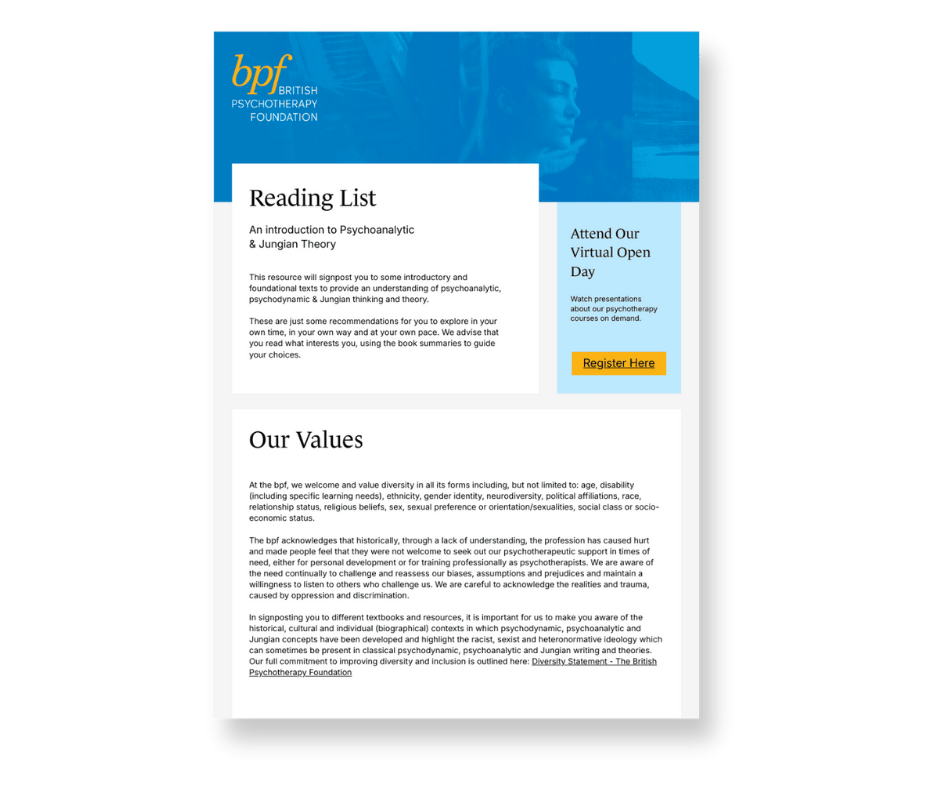
PPA Psychoanalytic Psychotherapy Training (Modified Entry Scheme)
Intensive Psychoanalytic Training
In-person training location: 37 Mapesbury Road, London NW2 4HJ. Part-time course.
The MES route is for those who already have a qualification in psychoanalytic psychotherapy as an adult psychotherapist, child and adolescent psychotherapist, or as a couples therapist. In very exceptional circumstances, those with a qualification as a psychodynamic psychotherapist may be considered.
The PPA training incorporates best clinical practice and high standards, and it is accredited by the British Psychoanalytic Council. Once qualified, you will join the Psychoanalytic Psychotherapy Association (PPA) and register for full bpf membership. You will be eligible for registration with the British Psychoanalytic Council, which is regulated by the Professional Standards Authority.
With this training, therapists are well equipped to work intensively and in depth with adult patients in private practice, or to apply the model to work in the NHS, higher education and the third sector. Further training and CPD opportunities are available to all bpf members.
Applications are accepted throughout the year.
If you are considering our MES route, please complete our preliminary questionnaire here:
If you are interested in training with the PPA but do not meet the criteria for applying to undertake the MES, please click here for information about the full training route.
For more information, email: [email protected].
- Course content
- Course structure
- Entry requirements
- Course fees
- Resources
- Access information
- How to apply
The PPA training prepares therapists to work intensively at a minimum frequency of three times per week, allowing for a deep therapeutic experience that seeks to address the root causes of emotional distress beyond alleviating symptoms.
Our theory programme is grounded in the British Object Relations School, exploring the thinking and influence of Freud, Klein, Winnicott, Bion, the British Independents and Post-Kleinians, as well as contemporary contributions to psychoanalytic thinking and practice. Our focus is on the relevant application of Psychoanalytic ideas in the present day, grounding modern thinking in a thorough understanding of the past.
The programme follows all the clinical requirements of the full training. Modified entrants will be required to complete a minimum of 30 theoretical seminars offered by the PPA during the course of the training. The theoretical curriculum will be chosen in discussion with a personal tutor to supplement previous theoretical learning.
Trainees will undertake the treatment of two intensive training cases, each seen with weekly supervision, and will be required to attend weekly clinical seminars until qualification. Generally, MES trainees begin working with their first training patient in their second term on the training.
The theory and clinical seminars are held on Tuesday evenings, between 6.30 – 09:45pm. There are two Saturday seminars per term, with additional plenary sessions with the PPA Training Committee.
MES trainees who have not undertaken a previous Infant Observation for a minimum of 12 months, will be required to undertake an Infant Observation course before qualification. Find more information on our Infant Observation course here.
Personal Therapy, Infant Observation and Psychiatric Experience
Modified entrants are required to have undertaken a full personal psychoanalytic psychotherapy/psychoanalysis at a frequency of at least 3 times weekly, for at least five years.
In exceptional circumstances, if an intensive personal psychoanalytic psychotherapy/psychoanalysis has not been completed before applying to train with the PPA on the MES route, then it will be a condition of an offer for the MES that the therapy continues at a frequency of at least 3x weekly, and that the applicant’s therapist is approved by the PPA Training Therapists’ Committee, if not already on the list.
For those who have completed a full personal psychoanalytic psychotherapy/psychoanalysis, further therapy may be recommended following the selection interviews and may emerge as a requirement at the discretion of the PPA Training Committee during the training.
Trainees are expected to have completed an Infant Observation course. When an Infant Observation was not undertaken, trainees will be required to complete one during the training. Find more information on our Infant Observation course here.
Trainees are expected to have gained some psychiatric experience during their previous training. Those without psychiatric experience will be required to undertake a psychiatric placement during the training.
Residence and Language
Enrolment on the PPA training does not currently qualify for a visa.
All applicants for the PPA training are required to hold indefinite right to remain (ILR) in the UK, and to be in a position to support themselves financially during the training, which is an intensive clinical programme requiring long-term, in-person work with training patients.
Please note that current student and/or any other time-limited visas do not meet the entry requirements for the PPA training.
Qualification with the PPA is dependent on the completion of long-term clinical work with training patients in person. It is normally the case that trainees may take up to 5 or more years to qualify as psychoanalytic psychotherapists with the PPA. For this reason, considering that our programme does not currently qualify for a visa, we are unable to accept applications from those who do not hold indefinite right to remain (ILR) in the UK.
The PPA training is delivered in English. Where English is not their first language, applicants may be asked to demonstrate that their use of spoken and written English is sufficient to participate in the academic and clinical components of the course.
PPA Full Training
If you are interested in training with the PPA but do not meet the criteria for applying to undertake the MES, please click here for information about the full training route.
Undertaking a clinical training in Psychoanalytic Psychotherapy represents a major personal investment in terms of time, finances and individual development. We are currently unable to offer financial support to trainees. However, we review our fees regularly with the aim to keep them as affordable as possible. The bpf does not subsidize transport or accommodation expenses.
Personal therapy and supervision are not included in the course fees.
When trainees begin their work with training patients through the bpf’s Clinical Services, the trainee will invoice the patient directly.
View Course Fees
Course fees are subject to an annual increase. A full academic year consists of 3 terms.
If an Infant Observation is undertaken during the course, there is an additional fee.
Trainees also pay an annual bpf membership fee, which provides access to the bpf library, to PEPWEB (an excellent online resource of psychoanalytic literature), and access to bpf’s wide-ranging scientific and cultural life.
For more information, visit this page to view the latest course fees.
The trainee’s fees for their own personal therapy are negotiated with the Training Therapist on an individual basis. Similarly, when beginning to see training patients, the cost of supervision will be discussed with each Training Supervisor. Trainees will need to provide an appropriate setting to see training patients and this may involve room rental costs.
View PPA Curriculum
Attend our Virtual Open Day to watch a presentation about this course.

Blogs
Frequently Asked Questions About Psychodynamic Psychotherapy
How to become a psychotherapist in the UK – The British Psychotherapy Foundation
My Journey as a Black Trainee in Psychodynamic Psychotherapy – The British Psychotherapy Foundation
How Couples Psychotherapy Can Transform Relationships – The British Psychotherapy Foundation
Why become a psychotherapist? (part I)
Why become a psychotherapist? (part II)
Videos
What’s it like to be a psychotherapist? Psychoanalytic psychotherapist (youtube.com)
What’s it like to be a psychotherapist? Child and Adolescent Psychotherapist (youtube.com)
What’s it like to be a psychotherapist? Jungian Analyst (youtube.com)
The building has limited access – please email [email protected] or call us on 020 8452 9823 to discuss your needs.
If you are considering our MES route, please complete our preliminary questionnaire here:
Once received, we will be in touch with you to schedule a call with a member of our Training Committee to discuss your circumstances in more detail.
Please note that the course for new trainees will begin in September 2026, not January as in previous years. The preliminary application deadline is set for 13 April 2026. Further details about the PPA Platform Year will be published shortly.
Application Stages:
- Preliminary Questionnaire
- Informal discussion with a member of the PPA Training Committee
- Submission of an Application Form (if recommended)
- Undertaking two or more interviews with an experienced clinician, as required
- Outcome
Please ensure you have carefully read the information on the PPA pages of the bpf website including the entry requirements.
Application fee: £170
If you have any queries, please contact the PPA Training Manager on [email protected].
The bpf is committed to diversity and inclusivity in all the work we deliver. We are fully dedicated to promoting, maintaining and supporting equality of opportunity in all aspects of our organisation and, as such, the bpf welcomes applications from all sections of society.

New Courses
- Awakening the Inner World: An Experiential Weekend for Beginners – (Taught in London, 5th–6th & 26th–27th September, 2026)
- Intensive Summer School: Foundations of Psychoanalytic & Jungian Psychotherapy – (Taught Online, Thursday 16th to Monday 20th July, 2026)
- Reading Group – Psychoanalytic Psychotherapy Association – (Taught Online, Rolling Entry)
- Psychodynamic and Jungian Theory for Qualified Practitioners (Taught Online, September 2026)
bpf North:
- Foundation Course (Taught in Newcastle, October 2026)
- Psychoanalytic & Psychodynamic Psychotherapy Training (Taught in Newcastle & Online, October 2026)
Upcoming Events:
- 31st January, 2026 – Barbara Dockar-Drysdale One-Day Conference (Public Registration Page) – Time: 10:00 – 14:45. Venue: Hybrid event – BPF Mapesbury Rd & Online via Zoom. Price: Public admission fee (In Person) £35, Public admission fee (Online) £25.

Make a £10 Donation – Receive a Psychoanalytic Reading List
Donating supports our mission to make our psychotherapy training, clinical services, and public events affordable, accessible, and more inclusive.
Reading List: Introduction to Psychoanalytic & Jungian Theory
Receive a curated list of 67 essential texts – covering psychoanalytic, psychodynamic, and Jungian theory – ideal for both newcomers and those wanting to deepen their knowledge.

